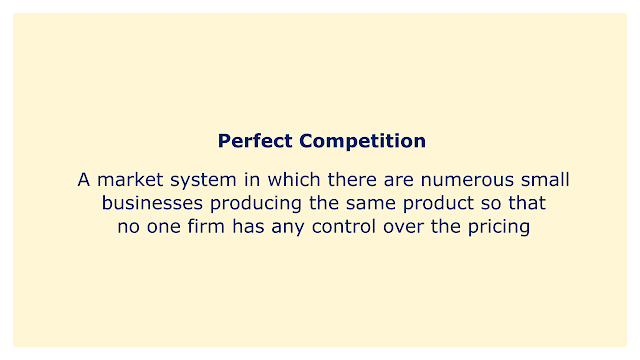 |
| Image: Moneybestpal.com |
Perfect competition is a market system in which there are numerous small businesses producing the same product so that no one firm has any control over the pricing.
In order for this market structure to exist, the following requirements must be satisfied: first, all companies selling in the market must sell the same product; second, all companies selling in the market must be price takers, which means they cannot change the product's price; third, there must be a large number of buyers and sellers in the market; fourth, there must be no barriers to entry or exit, which means any company can easily enter or leave the market without incurring significant costs; and fifth, all buyers must have perfect information available to
Because every attempt to raise prices above the market equilibrium will result in customers migrating to competitors, firms cannot sustainably make anomalous profits in a completely competitive market. Because of this, businesses in a highly competitive market are compelled to run profitably at the lowest feasible cost.
Market efficiency is frequently measured against the idea of ideal competition as a standard. As a result of entrance obstacles, product differentiation, and incomplete information, the majority of markets do not actually conform to the ideal of perfect competition. The model of perfect competition is still helpful for comprehending the foundations of market economics and how markets might operate in theory, though.
Because every attempt to raise prices above the market equilibrium will result in customers migrating to competitors, firms cannot sustainably make anomalous profits in a completely competitive market. Because of this, businesses in a highly competitive market are compelled to run profitably at the lowest feasible cost.
Market efficiency is frequently measured against the idea of ideal competition as a standard. As a result of entrance obstacles, product differentiation, and incomplete information, the majority of markets do not actually conform to the ideal of perfect competition. The model of perfect competition is still helpful for comprehending the foundations of market economics and how markets might operate in theory, though.
